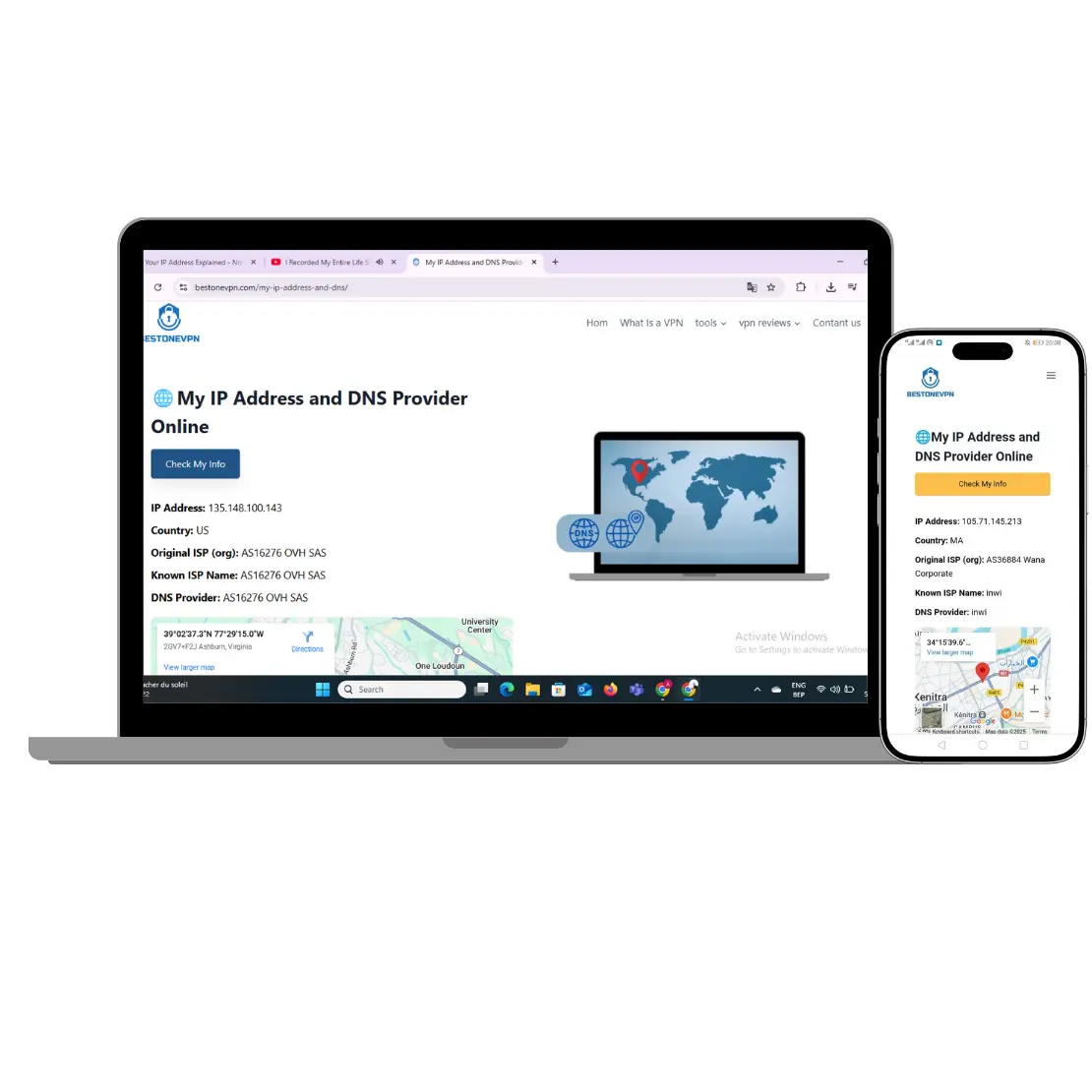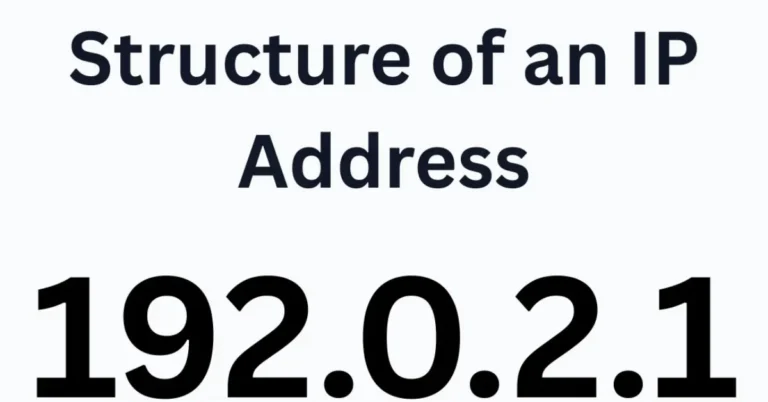What Is an IP Address? [Beginner’s Guide]
Have you ever wondered how your device knows where to send and receive data on the internet? That’s where IP addresses come in. In this beginner-friendly guide, we’ll explore what an IP address is, the different types of IP addresses, and the differences between IPv4 vs IPv6. You’ll also learn how IP addresses work and why they matter for your privacy, security, and everyday internet use.
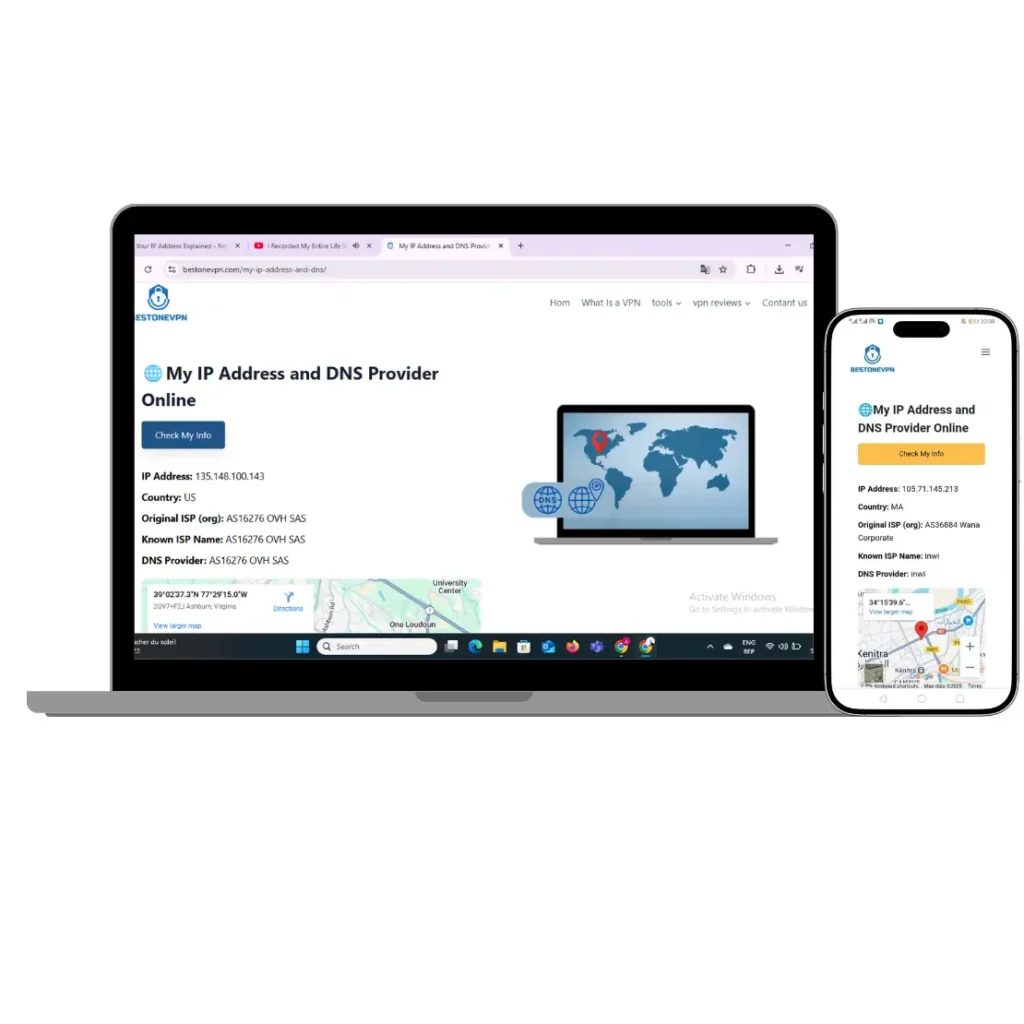
Table of Contents
What Is an IP Address?
An IP address (Internet Protocol address) is a unique number assigned to each device connected to a network. It acts like a digital home address that allows computers and devices to send and receive information online.
In Simple Terms:
Think of an IP address like your home address. If someone wants to send you a letter, they need your address. On the internet, websites need your IP address to know where to send data like videos, emails, or search results.
When you visit a website, your device sends a request that includes your IP address. The website replies and sends the information back to your IP address — just like a mail carrier delivering a package.
How Do IP Addresses Work?
Here’s a quick breakdown of how data travels with the help of IP addresses:
- You make a request: You type a URL like
www.youtube.com. - Your device sends a data packet: This is a tiny digital message asking YouTube for the page.
- The packet includes two IP addresses:
- Destination IP address: YouTube’s address
- Source IP address: Your device’s address
- The internet routes the packet: Routers and servers send it to the right destination.
- You get a response: YouTube sends the content back to your device using your IP.
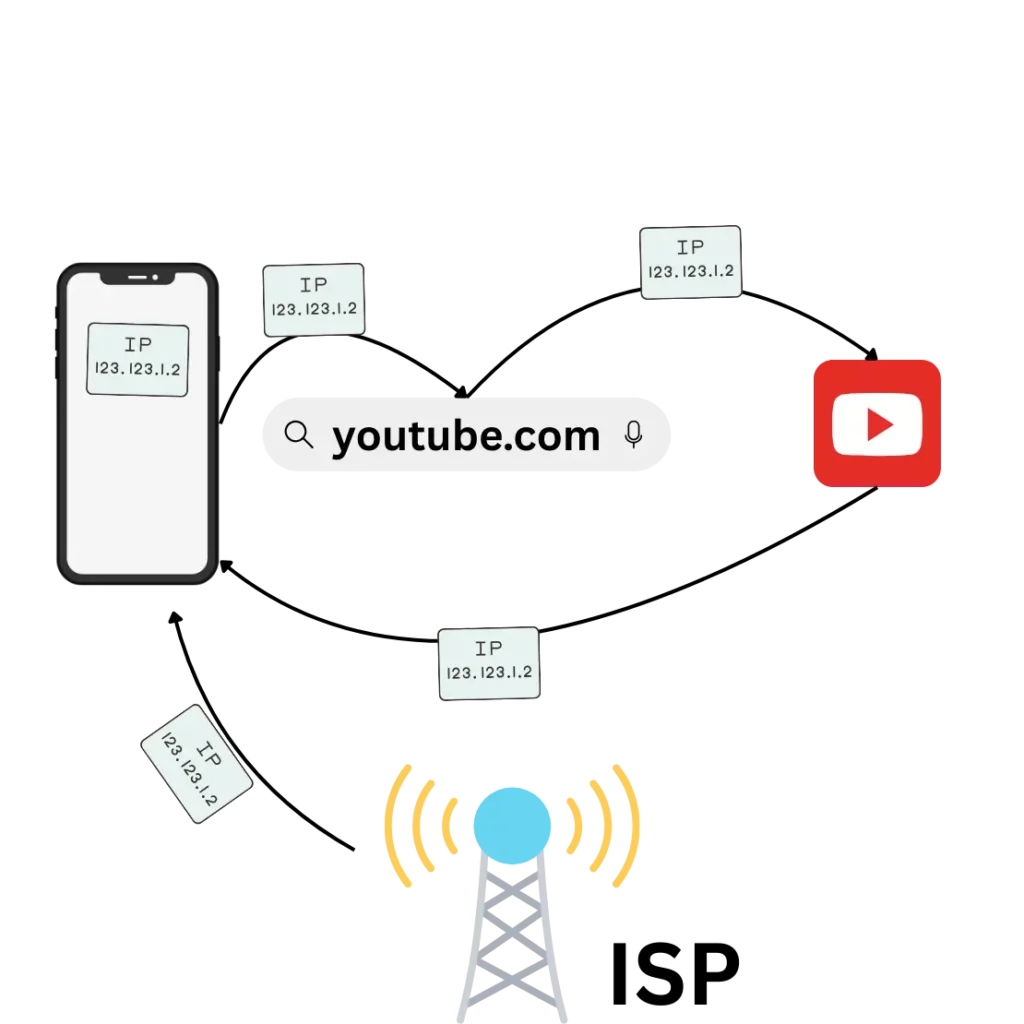
This all happens in milliseconds!
Types of IP Addresses
There are different types of IP addresses, and each plays a specific role in how the internet functions.
Public IP Address
- Assigned by: Your Internet Service Provider (ISP)
- Visible to the internet? Yes
- Use: Connecting to websites or external services
- Example: When you browse Google, your public IP is what Google sees.
Private IP Address
- Assigned by: Your home router
- Visible to the internet? No
- Use: Connecting devices within your local network (like your phone, smart TV, or laptop)
- Common ranges:
- 192.168.x.x
- 10.x.x.x
- 172.16.x.x – 172.31.x.x
Static IP Address
- Doesn’t change
- Often used by businesses, servers, or VPNs
- Helps with hosting websites or services
Dynamic IP Address
- Changes regularly
- Assigned automatically by your ISP
- Most home users have dynamic IPs because they are easier to manage
Shared IP Address
- Used by multiple users (common with free VPNs or shared hosting)
- Can lead to slower performance or issues with blacklisting
Dedicated IP Address
- Assigned to one user or device
- Offers better reliability and reputation
- Common in business and premium VPN services
IPv4 vs IPv6: What’s the Difference?
IPv4 (Internet Protocol version 4)
- Format: Four numbers separated by dots (e.g.,
192.168.1.1) - Each number is between 0–255
- 32-bit address space → ~4.3 billion unique addresses
- Still widely used, but running out of available addresses
IPv6 (Internet Protocol version 6)
- Format: Hexadecimal numbers separated by colons (e.g.,
2001:0db8:85a3:0000:0000:8a2e:0370:7334) - 128-bit address space → trillions of possible addresses
- Designed to replace IPv4 and support the future of the internet
- More secure, faster, and allows for more unique devices
Who Assigns IP Addresses?
IP addresses are allocated by the Internet Assigned Numbers Authority (IANA), a subsidiary of ICANN (a nonprofit based in the US). IANA doesn’t assign IP addresses directly to individuals or companies. Instead:
- IANA assigns large groups of IP addresses (called subnets) to regional internet registries (RIRs).
- RIRs distribute smaller IP blocks to ISPs, companies, or data centers.
- Your ISP assigns your IP address when you connect to the internet.
Why Should You Care About Your IP Address?
Your IP address isn’t just a number. It can reveal your:
- General location (city or region)
- ISP
- Browsing habits (when tracked by advertisers or websites)
This makes your IP address a target for hackers, trackers, and even government surveillance.
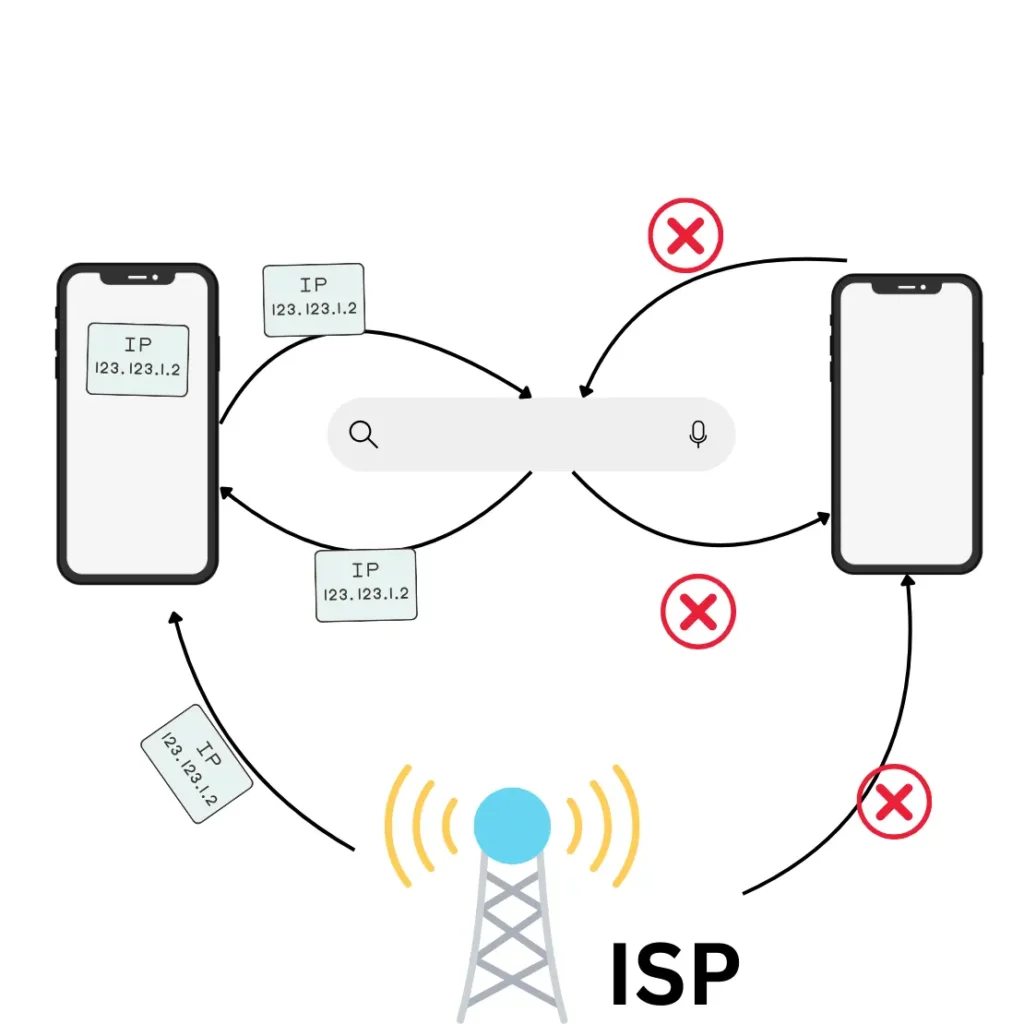
IP Address Security Risks (And How to Protect Yourself)
Common Threats
- Tracking your location: Advertisers can use your IP to serve location-based ads.
- Network attacks: Hackers can scan IPs for vulnerabilities.
- Illegal activity: Someone using your IP (on shared Wi-Fi) could get you in legal trouble.
- Hacking your device: Exposed IPs can lead to direct attacks on your devices.
How to Protect Your IP Address
- Use a VPN: A virtual private network hides your IP and encrypts your data.
- Use a proxy server: Hides your IP by routing your traffic through a different server.
- Avoid public Wi-Fi: Or use a VPN when using it.
- Update devices and firewalls: Prevent unauthorized access.
The Future of IP Addresses
- IPv4 is still dominant, but we’re running out of addresses.
- IPv6 is the future, offering more capacity and better security.
- As more devices connect to the internet (phones, smart homes, cars), IPv6 adoption will continue to grow.
- Universities and companies are already monetizing unused IPv4 addresses by leasing them.
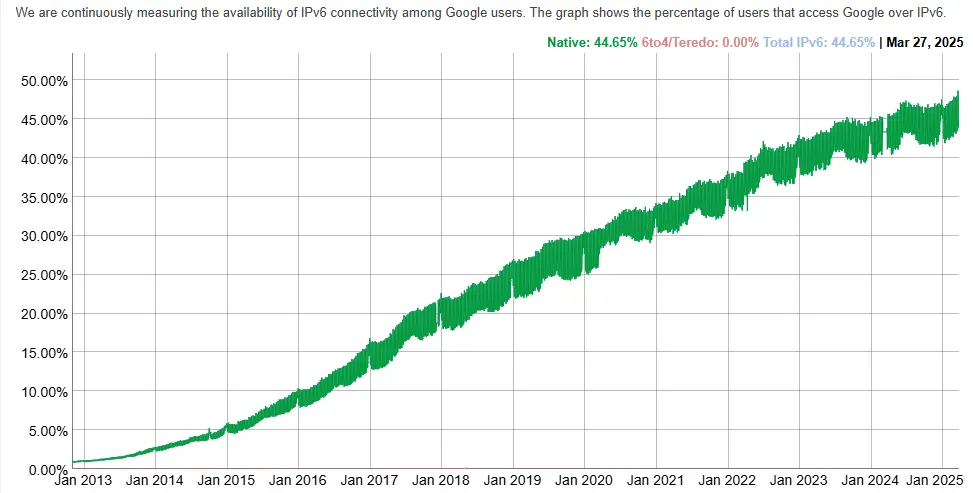
Per-Country IPv6 adoption
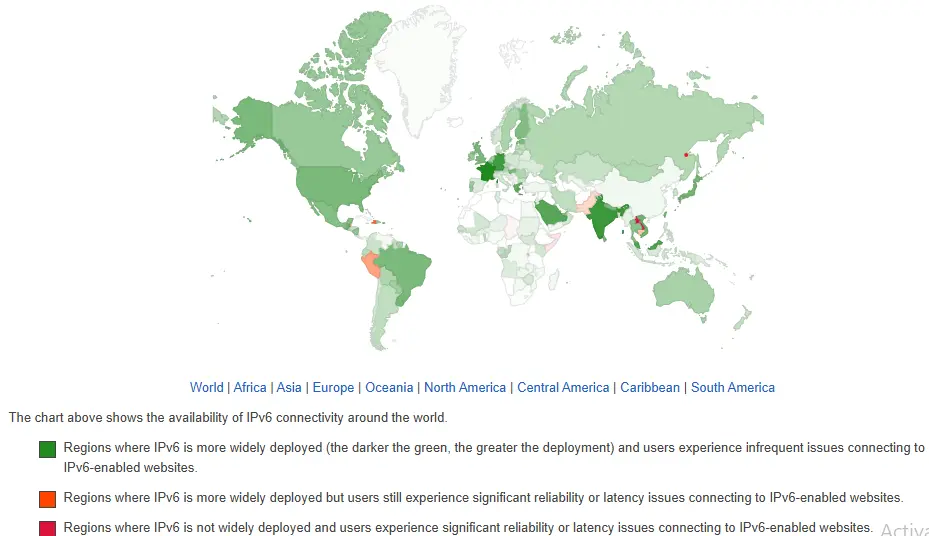
Final Thoughts
Now that you understand what an IP address is, you can see how important it is in the digital world. Whether you’re browsing the web, using smart devices, or protecting your privacy, your IP address plays a key role in keeping things connected and secure.
Knowing about IPv4 vs IPv6, the types of IP addresses, and how they work puts you a step ahead in understanding how the internet functions.
FAQs
Q: Can someone hack me with my IP address?
A: Not easily, but they can try scanning your network for vulnerabilities. A VPN or firewall helps prevent this.
Q: How do I check my IP address?
A: You can simply search “What is my IP address?” on Google, or visit websites bestonevpn.com.
Q: Should I hide my IP address?
A: If you care about privacy, yes. A VPN is the easiest and most secure way to do it.

